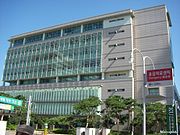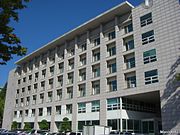Konkuk University: Difference between revisions
Marcopolis (talk | contribs) |
Marcopolis (talk | contribs) |
||
| Line 121: | Line 121: | ||
Education |
Education |
||
School of General Education |
School of General Education |
||
| ⚫ | |||
| ⚫ | |||
---- |
|||
The Graduate School was established on February 26, 1959 to promote the development of profound academic theories essential to the development of human society. |
The Graduate School was established on February 26, 1959 to promote the development of profound academic theories essential to the development of human society. |
||
Since its esta-blishment, the school has grown continuously. In 1994,the graduate school offers 54 major fields on the master's level and 41 major fields on the doctoral level |
Since its esta-blishment, the school has grown continuously. In 1994,the graduate school offers 54 major fields on the master's level and 41 major fields on the doctoral level |
||
Revision as of 00:56, 1 February 2008
Konkuk University (Korean: 건국대학교, Hanja: 建國大學校) is a private university in Seoul. It is located in the southeastern part of Seoul, near the Han River, and is served by a metro station of the same name. The university possesses accreditation from the South Korean Ministry of Culture and Education. The university emphasizes technology and science majors and research.
The university was founded in 1948 by Dr. Suk-chang Yoo. It originally started as a political science institution known then as The Chosun Political Science School before becoming Konkuk University two years later.
External
Template:Korea-university-stub
History
Human beings are free to pursue their own interests and knowledge and get the benefits from the glorious culture developed by preceding generations, but they also have the responsibility to develop human civilization further. The primary purpose of college education is to help people fulfill this responsibility by educating the younger generation for the future.
The philosophy of the late Dr. Yoo, Suk-Chang, the founder of Konkuk University, states that "sincerity, fidelity and righteousness" should act as rules of conduct to serve as the basis of morality and citizenship. Besides this moral goal, Konkuk university has been concentrating its efforts on offering a scientific and technological education, through which the students can become able leaders in contemporary society, while performing their historical tasks.
An advanced industrial society needs more and more intelligent citizens. Korea, as a developing country, urgently demands more and better intelligent citizens with technological knowledge and skills. To meet this demand, Konkuk university has been making efforts to improve its educational system, equipment, and facilities.
During the Japanese colonial rule, the late Dr. Yoo, Suk-Chang, in cooperation with 45 other patriots, established the "Minjung Hospital"(The People's Hospital) and published a medical paper entitled "The Doctors' News." These 45 patriots were representatives of various newspapers, religions, and other anti-Japanese groups. They supported Dr. Yoo's national independence campaign through medical services. They were also closely related with the 33 signers of the Declaration of Independence in 1919.
In May, 1946, Dr. Yoo established the "Chosun Political Science School," the early predecessor of Konkuk University. In May, 1948, the "Chosun Political Science Institute" was established under the school. In September, 1949, a Political Science Foundation and the Political Science College were authorized as a formal higher education institution. In 1955, the foundation procured over 2.3 km of land in Changan-Dong, Seoul, where the college moved in October 1955, leaving the evening school in Nakwon-Dong. In February, 1959, the institution was renamed as the Konkuk University Foundation and Konkuk University. In 1980, Chungju Campus was established in the city of Chungju, the center of Korea. This new campus is expected to expand on a larger scale.
At present, the foundation has two campuses with an area of 1 km2, the experimental farms and forests with an area of 5.3 km2, and 5 business enterprises to support academically and financially the university and the related educational organizations. Konkuk University celebrated its 54th anniversary in May 2000, yielding 86,792 bachelor's degrees, 13,846 master's degrees, and 1,216 doctoral degrees so far. The university has also strengthened the international aspects of education, fostering exchanges of students and faculty with some twenty top-class universities worldwide through sister relationships. Approximately 20,000 students are now registered at the university, including 2,000 graduate students. There are 589 full-time faculty members and about 864 part-time instructors.
The foundation runs Konkuk University and a junior and a senior high school. The University(the main campus in Seoul and a branch campus in Chungju) consists of 12 graduate schools and 16 colleges, including 86 departments and 33 research institutes. The University takes pride in offering a number of scholarships to qualified students, the amount of which has been increasing every year.
Konkuk University gallery
-
Campus main building
-
Campus main building
-
Industrial-educational cooperation building
-
Faculty of Art & Culture
-
Faculty of Art & Culture
-
Millenium memory building
-
Faculty of engineering
-
Open theater
Spirit Foundation
The late Dr. Yoo, Suk-Chang, the founder of Konkuk University, said that the only way to permanently secure freedom and prosperity for the liberated fatherland was to build up a genuine cultural state based on democracy. In order to establish a high-standard cultural state, he reasoned, an industrial state should be first built up wherein agriculture and manufacturing industries are modernized; this should be transformed into a welfare state where all the people may enjoy their lives in equal opportunity. Upon reaching this stage, he believed, it could be easily developed into the cultural state to which we aspire.
In his philosophy, two things were thought to be most essential from the outset for the completion of a high-degree cultural state by stages as envisaged above:
Therefore, the late Dr. Yoo resolved to dedicate the rest of his life to the cause of higher education.
To sum up, the motivating spirit in founding this university lies in its intention to bring promising youths together, educating them in the virtues of sincerity, fidelity, and righteousness, with emphasis on human education, and encouraging them to nurture personalities equipped with a pioneering spirit of faithful, even assiduous and valiant, service, while at the same time arming them with the science and skills so that they will be able to fulfill the historical mission of our times.
Academic year
Academic Year begins on March 1, and closes at the end of February of the next year. The first semester runs from March 1 through, the middle of June.
The second semester extends from the end of August through the middle of December.
Classes are held weekdays except on national holidays and university foundation day.
Admission
The undergraduate colleges admit students only in March, at the beginning of the first, or spring semester. Graduate schools, while normally admitting students in the spring, accept a limited number of students in September, for the second, or fall term.
An applicant for regular undergraduate admission to Konkuk University must be a graduate of an accredited high school or pass the government-administered high school equivalency examination. In addition, each applicant must have attained a competitive score in the College Entrance Examination administered by the University in December or January of each year.
Detailed information on each year's admission procedure is publicized through the mass media in December and January, and completed application forms must be delivered to the Admission Office directly from the applicant's high school principal.
Applicants are granted admission on the basis of the results of their Scholastic Aptitude Test and their high school records. All applicants must take an essay-type test and oral interview on the day arranged by the university.
Foreign students who have completed high school (twelve grades) or the equivalent are accepted when they are judged to have an adequate command of Korean language according to the entrance examination. The entrance examination for foreign students includes Korean, an interview, and a physical checkup. The following documents are required to complete the application:
Application for admission Certificate of high school graduation and transcripts Alien residence certificate Two letters of recommendation A letter of financial guarantee
The number of students who can be admitted each year to each department in every university in Korea is regulated by the Ministry of Education.
The total school days per academic year must not be less than 210 days. The minimum and maximum length of enrollment for baccalaureate degree is four years and six years
College
Liberal Arts Science Architecture Engineering Telecommunications Political Science Law Commerce and Economics Business Administration Animal Husbandry Life Environment Science Veterinary Medicine Design and Human Education School of General Education
Graduate School
The Graduate School was established on February 26, 1959 to promote the development of profound academic theories essential to the development of human society. Since its esta-blishment, the school has grown continuously. In 1994,the graduate school offers 54 major fields on the master's level and 41 major fields on the doctoral level
Candidates with a Bachelor's degree from an accredited university is required to pass the entrance examination in the written test on the applicant's profield of study and English as a foreign language. Candidates with a Master's degree from an accredited university is required to pass the entrance examination in the written test on the applicant's higher knowledge of proposed field of study and English as a first foreign language.
Applicants to the department of Korean, English, Philosophy and History must demonstrate competence in the second foreign language among Chinese, German, French, Japanese and Chinese letters.
Advanced degree programs for foreign students and Korean students abroad :
The general rules and regulations of the Graduate School for Korean students are equally applied to foreign students and Korean students abroad. The student must demonstrate competence in Korean language test for successful completion of the course. Most of the graduate courses are taught in Korean.
KOREAN LANGUAGE AND LITERATURE FEED AND NUTRITIONAL SCIENCE ENGLISH LANGUAGE AND LITERATURE VETERINARY MEDICINE PHILOSOPHY LIVESTOCK MANAGEMENT HISTORY AGRONOMY JAPANESE LANGUAGE AND LITERATURE AGRICULTURAL CHEMISTRY AGRICULTURAL CHEMISTRY EDUCATION FOREST RESOURCESHORTICULTURAL SCIENCE GERMAN LANGUAGE AND LITERATURE AGRICULTURAL ENGINEERING FRENCH LANGUAGE AND LITERATURE AGRICULTURAL EDUCATION POLITICAL SCIENCE AGRICULTURAL ECONOMICS ECONOMICS CHEMICAL ENGINEERING LAW INDUSTRIAL ENGINEERING PUBLIC ADMINISTRATION ELECTRICAL ENGINEERING BUSINESS ADMINISTRATION ELECTRONIC ENGINEERING INTERNATIONAL TRADE TEXTILE ENGINEERING APPLIED STATISTICS ARCHITECTURAL ENGINEERING REAL ESTATE SCIENCE CIVIL ENGINEERING BIOLOGY MICROBIOLOGICAL ENGINEERING CHEMISTRY MECHANICAL ENGINEERING PHYSICS ENVIRONMENTAL ENGINEERING GEOGRAPHY COMPUTER SCIENCE MATHEMATICS INDUSTRIAL CHEMISTRY HOME ECONOMICS MECHANICAL DESIGN CLOTHING AND TEXTILES PHYSICAL EDUCATION BIOCHEMISTRY MUSIC ANIMAL SCIENCE INDUSTRIAL DESIGN MEDICINE DAIRY SCIENCE







